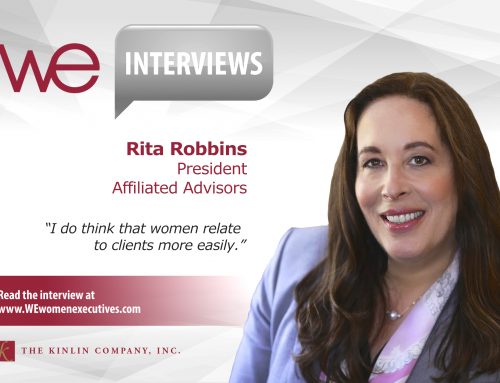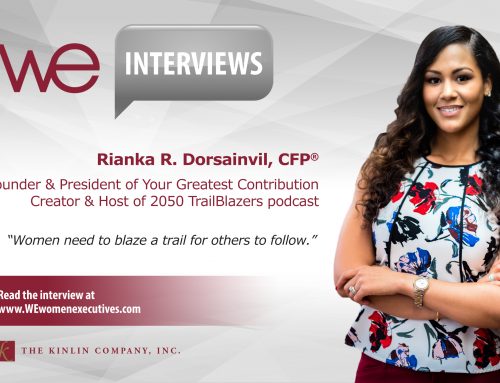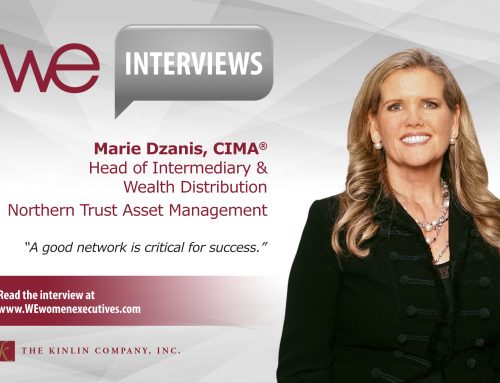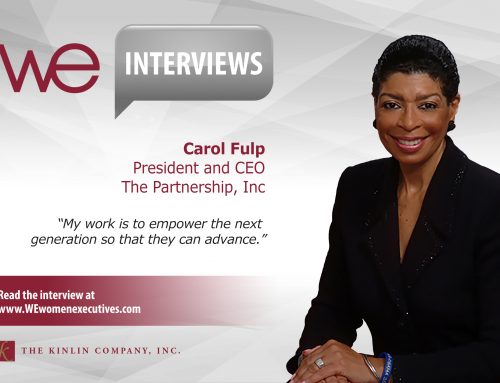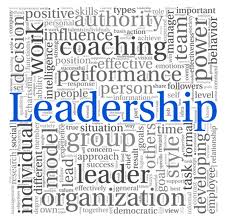 I have had the privilege of interviewing many remarkable women over the course of our WE Interviews series. While there are many consistent themes, each executive has their own unique perspective. Here, a compendium of helpful advice and knowledge shared by a great group of women:
I have had the privilege of interviewing many remarkable women over the course of our WE Interviews series. While there are many consistent themes, each executive has their own unique perspective. Here, a compendium of helpful advice and knowledge shared by a great group of women:
Mentors Crucial to Success
Many of the women we have interviewed credit mentors with their professional advancement:
Eve Ellis, Financial Advisor with Morgan Stanley’s Matterhorn Group, believes that having mentors and sponsors is important: “There’s been so much talk about finding a mentor, finding a sponsor, and the differences between the two, but in thinking more about it, I think women really need to find or develop their own village, both personally and professionally, because women need both. So I would say first find your village, second raise your hand even if it’s scary or risky.”
Deborah Kuentsner, Chief Investment Officer for Wellesley College, received advice that has resonated over the years: “I had a mentor at DuPont who encouraged me to think about my career in terms of risk–what are the risks of staying where I am and doing what I’m doing? What are the risks of trying something different?” When the time came to make a critical career decision, “I said to myself, ‘You know what? I can hold on with one hand and feel around with the other to find something else, or I can just let go with both hands and take the plunge and look around.'” She decided to take the plunge. Martha King, Managing Director of Vanguard’s Financial Advisor Services Division and Head of US Financial Intermediaries, credits her mentors with helping her to move past her comfort zone. “When my mentors asked me to do something, I trusted their belief in me that I could do it. So, I set about the business of getting it done. It was as simple as that; they gave me that push forward.”
Work Life Balance
“Balance” has become a buzzword in recent years, yet the irony is that it is more difficult to achieve than ever. Many of the women we interviewed believe that balance 100% of the time is impossible and that prioritizing what is important at the time is key. Moreover, Michelle Seitz, partner and head of William Blair Investment Management, believes the discussion may be counterproductive:
“The entire debate has no relevance for most of the world. The vast majority of people have jobs, they have children, and they figure it out. Most people have to work; they don’t have the luxury of choice. That’s why I think it sometimes becomes a very entitled conversation. The conversation about why so few woman break into the upper echelons of management is a separate issue.”
Christine Hurtsellers, Chief Investment Officer, Fixed Income at Voya Investment Management, notes that with respect to work and family balance: “Women tend to be perfectionists. The truth is that, in both life and work, you’re not always going to get everything right… My number one piece of advice to working women is to stop being so hard on yourself. You don’t have to be perfect. Spend quality time with your children. Be with them when they’re sick. Let them know that you love them. That’s what really matters.” Lori Massad, Alliance Bernstein’s Head of Human Capital and Chief Talent Officer, advises women in particular to think of their careers as a train: “There’s the express train, when your career is your priority, and you can really go all out. And there’s the local train. It’s slow and it makes a lot of stops, but you are still going somewhere. Throughout your career, you should have the confidence that even if you get on the local for a while, you can transfer back to the express when you are ready. The main objective is to not get off the train so that you can maintain the option to catch the express.”
Sandy Urie, Chairman and CEO of Cambridge Associates, says: “I worry a bit that women are trying too hard to plan out their futures, rather than allowing for instances of serendipity, those organic moments in a career that present themselves when you think you’re on another path… I’ve never really thought about the work/life balance explicitly, I’ve just found a way to make it work. I never thought it was my employer’s responsibility to make the situation work for me, it was mine.”
Professional Advice
Many of these seasoned professionals had advice for women in business, but their counsel was not necessarily gender-specific.
Karla Rabusch, President of Wells Fargo Advantage Funds, believes seeking feedback and workplace integrity are essential. “Seek feedback and act upon it. The people that succeed really listen to feedback, take it to heart, and make a concerted effort to strengthen their weak spots… When I speak of integrity, I’m talking about the ethical aspect of it, but integrity encompasses more than that. It means leading by example, walking the talk, being consistent and transparent, and treating people with respect.”
Kim Sharan, who recently retired after serving as both the President of Financial Planning & Wealth Strategies and CMO of Ameriprise Financial, says that leaders act and do not wait for someone to promote them: “Leaders are not waiting to be asked to move up the ladder,” she said. “Companies respond to people who are hungry, who want to better themselves, and who want to contribute more to the business,” she said. Cindy Caruso, Global Head of Human Resources for BNY Mellon Investment Management, agrees in taking ownership. “You have to have high expectations for what you want to accomplish and you have to continually work towards meeting those goals. Never sit back and blame your lack of progress on the company’s failure to provide you with opportunities. You have to create your own opportunities.”
Amy Unckless, Head of Private Wealth Management and Global Chief Administrative Officer for Columbia Management, credits failure as an important part of the learning process for any professional. “Though this probably doesn’t set me apart from anyone else, I really don’t like failing,” she said to me with a smile. “But I learned that if I don’t fail occasionally, then I’m probably not stretching myself enough and, therefore, I’m not learning and growing as much as I could be.” Mellody Hobson, President of Ariel Investments, has a similar perspective. The real test of success is how you get back up. “Often women aren’t given the same benefit of the doubt that men are given, so we can often get more discouraged. I would advise: Keep going. Keep pushing. Do not give up.”
Women in Business and Giving Back
These women practice what they preach. Kelly Williams, President of Private Markets at GCM Grosvenor, believes it is important to give back: “One of my passions is expanding opportunities for women and minorities in the asset management world. I’m on the board of the Robert Toigo Foundation. Their motto is ‘Changing the Face of Wall Street’ and they provide fellowships to business school for women and minorities. I’m a member of the advisory board of Sponsors for Educational Opportunity, which does the same thing for inner city kids going from high school to college. I’m also on the board of the Council of Urban Professionals, which helps to develop women and people of color as leaders in government and financial services, and I was a financial sponsor in the Toigo Foundation’s Groundbreakers program, which focuses specifically on women’s leadership.”
Christine Todd, the President of Standish and head of both the Tax Sensitive Division and Insurance Asset Management Strategies, has an empowering message to women. “Use the fact that you’re a woman to your advantage. It is a huge plus, and it frustrates me when people say, ‘I can’t get ahead because I’m a woman; they’re picking on me.’ You know what? Human beings are going to pick on people who allow themselves to be picked on. That has nothing to do with being a woman; it has to do with you letting it happen.'”
And lastly, Jackie Zehner, President of the Jacquelyn and Gregory Zehner Foundation and CEO of Women Moving Millions, provides a dynamic perspective: “Women’s power is emerging–big time! Never before have women come together to put their financial power behind women and girls’ advancement. Women’s economic clout–as holders of wealth, as investors, as allocators of capital—is growing. We’re in a moment where there’s a great deal of power in the hands of women that we’re just starting to use to create a more just, equitable and balanced world.”

